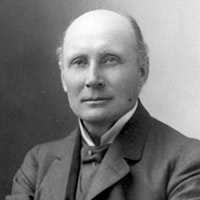The habit of the active utilization of well-understood principles is the final possession of wisdom.
Alfred North Whitehead

As Wisdom Grows
Topic: Wisdom & Understanding
In a sense, knowledge shrinks as wisdom grows, for details are swallowed up in principles. The details for knowledge, which are important, will be picked up ad hoc in each avocation of life, but the habit of the active utilization of well-understood principles is the final possession of wisdom.
Alfred North Whitehead, OM (15 February 1861 – 30 December 1947), began his career as an English mathematician and later became a philosopher. He was born in Ramsgate, Kent, and his early work focused on algebra, logic, and the foundations of mathematics. Together with Bertrand Russell, he co-wrote "Principia Mathematica," an influential work that aimed to base mathematics on formal logic.
Shifting from mathematics, Whitehead delved into philosophy, specifically the philosophy of science, physics, and metaphysics. This shift led him to develop process philosophy, which argues that reality is not made of static objects but of interconnected events and processes. His book, "Process and Reality," is central to this idea. Influenced by Whitehead's process philosophy, John B. Cobb helped develop Process Theology. This strand of Christian theology presents God as evolving, reactive, and deeply connected with the changing processes of the world.
In addition to his contributions in mathematics and philosophy, Whitehead had clear views on education. In "The Aims of Education and Other Essays," he stressed the importance of an education that goes beyond knowledge, aiming for wisdom. He believed that education should spark imagination and show students how they fit into the larger world. After moving to the United States, Whitehead continued his academic work until his death in 1947 in Cambridge, Massachusetts. His work stands as a bridge between the rigor of mathematics and the contemplative depth of philosophy.
The Rhythmic Claims of Freedom and Discipline
Whitehead, Alfred North. The Aims of Education and Other Essays. New York: New American Library, 1929, p. 46 ["The Rhythmic Claims of Freedom and Discipline"].

Alfred North Whitehead
Theme: Wisdom

Commentary About This Alfred North Whitehead Quote [Commentary]
Alfred North Whitehead’s statement, “The habit of the active utilization of well-understood principles is the final possession of wisdom,” clarifies how wisdom grows beyond the accumulation of knowledge. In the context passage, he observes that “knowledge shrinks as wisdom grows,” as countless details are “swallowed up in principles.” Whitehead affirms that while details remain important and must be gathered “ad hoc” in each situation, true wisdom comes from the habit of applying what has been deeply understood. It is this shift—from managing information to living by enduring principles—that marks the presence of wisdom.
Whitehead distinguishes between the passing nature of facts and the lasting value of principles. Knowledge may address immediate particulars, but wisdom rests on the “active utilization” of truths that endure across circumstances. His focus on habit shows that wisdom is not a possession held once and for all, but a continuous practice. The mind guided by “well-understood principles” can respond thoughtfully to changing conditions without being overwhelmed by detail. In this way, Whitehead describes wisdom as providing clarity and coherence in navigating life.
By emphasizing the “final possession of wisdom” as a habit, Whitehead underlines that wisdom depends not merely on understanding principles, but on living them. In a time when information multiplies rapidly, his insight remains clear: without the ability to distill and apply knowledge meaningfully, we remain caught in particulars. Through the steady practice of understanding and active use, the movement from knowledge to wisdom becomes possible, grounding life in deeper truth.
Additional Alfred North Whitehead Quotes
Stephen R. Covey on Principles
“Wisdom is the child of integrity—being integrated around principles. And integrity is the child of humility and courage. In fact you could say that humility is the mother of all the virtues because humility acknowledges that there are natural laws or principles that govern the universe. They are in charge. We are not. Pride teaches us that we are in charge. Humility teaches us to understand and live by principles, because they ultimately govern the consequences of our actions. If humility is the mother, courage is the father of wisdom. Because to truly live by these principles when they are contrary to social mores, norms, and values takes enormous courage…”
—Stephen R. Covey [The 8th Habit—From Effectiveness to Greatness] pages 296-297.
Related Quotes
Copyright © 2017 – 2026 LuminaryQuotes.com About Us